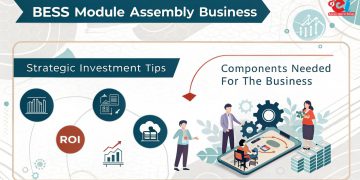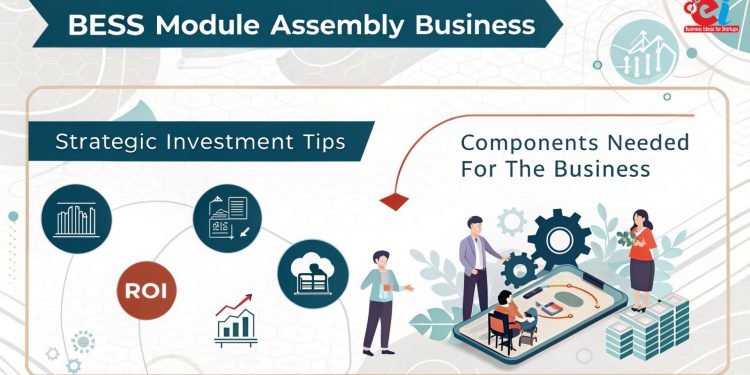The global decarbonization and energy decentralization movements are very active now more than ever, and BESS (Battery Energy Storage Systems) are now considered a vital technology. From balancing the grid to enabling the use of renewable energy and electric vehicles, as well as in smart homes, BESS modules have been pivotal to the new energy paradigm. Starting a business in BESS module assembly is a very attractive opportunity because entrepreneurs, investors, and even advanced manufacturers willing to seize this opportunity now can gain fast access to the clean energy industry worth billions of dollars.
This article gives in detail the prospects, risks, and coverage of investments, their critical elements, and the action plans designed to achieve success in establishing a BESS module assembly business. In addition, it describes how cooperation with professional institutions, such as Niir Project Consultancy Services, can assist a user for the feasibility, planning, and even the implementation of these projects.
The Impact of BESS Modules to the Energy Transition Plan
BESS modules enable various forms of energy to be stored and distributed. In terms of grid reliability, they can be used at the utility scale, while commercially and residentially, solar or wind energy may be stored using BESS modules. The components allow storing of energy during times of surplus supply and controlled dispatching during peak demand times.
The advancing deployment of variable renewable energy sources such as wind and solar is straining the existing power grid infrastructure on multiple fronts: reliability, frequency variation and general dependability. BESS modules address these challenges by providing flexibility, ramping, frequency regulation, peak shaving and other ancillary services. They are additionally fundamental to the charging infrastructure of electric vehicles, microgrid systems, and as part of a backup power system.
The disruptive potential of BESS is unparalleled in the modern energy economy due to its versatility and ease of expansion. Therefore, the local assembly of BESS modules with an emphasis on cost control and quality assurance presents not only a commercial venture, but also a tactical effort towards enhancing the energy resilience of the country.
Related: Handbook on Electric Vehicles Manufacturing
Market Potential for Battery Energy Storage System (BESS) Modules in India
With recent government initiatives to promote renewable energy sources, along with the modernization of power infrastructure and electric vehicle integration, India’s energy domain is on the cusp of a transformation. Enhanced fossil fuel free power generation capacity (non fossil) is targeted at 500 GW by 2030 as mentioned in the National Electricity Plan and this vision is futile without battery storage.
NITI Aayog’s projections suggest that by 2030 India will be in need of more than 180 GWh of energy storage capacity. We are currently reliant on countries like China, South Korea, and the U.S. for battery packs and modules, and India still does not have plans to manufacture these locally. Jika India battery could assemble indigenously manufactured modules, it could significantly reduce costs and create job opportunities, making India a global manufacturing hub for batteries.
In addition to utility-scale installations, commercial and industrial (C&I) entities are also adopting solar BESS systems for peak demand management and energy savings. Other prominent demand verticals include railways, agriculture, and residential users. Indian BESS module assemblers, particularly those with startup status, are positioned well to take advantage of these shifting trends, given their advanced skills and availability of educated labor.
Comprehending the BESS Module Architecture
In order to comprehend more about a BESS module, we first need to look at the system architecture. A BESS system can be broken down into three levels – cells, and modules, which create the battery packs. A BESS module indicates one level between battery packs and one of constituent units. Lithium-ion cells are usually placed within a BESS framework, typically housed in cylindrical or prismatic cases and arranged in series or parallel configurations to achieve the desired voltage and capacity.
A standard BESS module includes:
Battery pack modules (with BMS) or cells stacked vertically or horizontally that are configurable as either racks or packs, including:
- Active or passive thermal management
- Oil or water coolers
- Magnesium or Lithium ion
Additional features include structural frame and casing, Busbars and connectors, Thermal Management System (TMS) Also called Battery Management System (BMS), various sensors, cutoffs and valves such as temperature sensors or fuses and pressure valves and Thermal Sensors (TS) placed in critical pens.
Special attention to electrical isolation, heat control, physical structure, communication with BMS, and movement control is required during design. When the assemblies are combined with cooling systems, control systems and inverters in cases or racks under other equipment, they’re called Solar or Battery Energy Storage Systems (BESS).
Choice of the cell type, monitor unit system or control frame with relayed PMS, long term reliability and cell supplier make winning storage solutions that last and are unyielding.
Basic Considerations in Setting Up a Business For BESS Module Assembly
Creating a plan, a consignment flow, skilled human resource baining, with efficient precision tools, systemise design and develop marketing and CNC equipment literally draws out the steps for constructing a point guide or Assembly of the module. Identify the market first, such as residential energy, infrastructure developers, EPC’s, service blades, etc.
Following technical market definition, achieving goals responsible for forming specifications like, give mark on range of kWh, maximum charge discharge ratio for capping along with preferred body measurement shall lead towards planning and ordering the assembly parts.
The module assembly line integrates these processes:
- Cell testing and sorting: Cells are examined within a range for voltage, internal resistance, and capacity to confirm uniformity within batches.
- Cell stacking and alignment: Pouch and prismatic cells are aligned into fixtures. Cylindrical cells may be placed in holders or slots.
- Busbar welding: Interconnections are made ultrasonically, with lasers, or via resistance welding.
- BMS integration: Every module receives BMS PCBs. These are linked to the voltage and temperature sensors.
- Casing and enclosure: The module casing consists of aluminum or plastic shells that include insulation and cooling provisions.
- Final testing: The module is checked electrically, thermally, and mechanically before dispatch.
It is critical that all assembly process includes safety, compliance, and traceability systems. ESD protective clothing, cleanroom conditions, and anti-static floors are also key to the processes.
Investment Requirements and Infrastructure Planning
A medium-scale BESS module assembly plant with a capacity of 100 MWh/year would typically require:
- Plant area: 10,000 to 15,000 sq. ft.
- Machinery & equipment: Tab welders, cell testers, battery module aging racks, BMS testers, assembly and ESD benches, as well as thermal test chambers.
- Capital investment: Between ₹8 and ₹15 crore on imported equipment and automation.
- Manpower: With Engineers, Operators, QC Staff, total manpower is 15 to 30.
- Certifications: ISO 9001, ISO 14001, IEC 62619, UL 1973, and AIS-156 for automotive packs, among others.
NPCS assists in setting up a business by procuring permits and licenses. NPCS has developed Detailed Project Reports (DPRs) that entrepreneurs can easily purchase devoid of needful scheming. Students wish these DPRs to contain layout designs, machinery specification, costing models, list of suppliers, and licencing guidance, which helps avert expensive drawn-out blunders.
Regulatory Compliance, Safety and Security Requirements
Batteries classified as electro chemical energy storage devices must follow safety and environmental regulations with no exceptions. Compliance standards for an energy storage system (BESS) module includes:
- Indian Standards Institute and International Electrotechnical Commission security and performance standards for batteries.
- FSSAI or the Food safety and standards authority for India and other pollution controlling boards, safety measures when setting up manufacturing facilities.
- Fire control measures due to flammability constraints.
- Retail electric vehicle batteries fall under the class of e-waste management and hence are subject to the battery waste management policies set out in India’s e-waste management guidelines.
- Third party testing and certification by National Accreditation Board for Testing and Calibration Laboratories (NABL) accredited labs.
- Vendors are required to comply with Restriction of Hazardous Substances (RoHS), CE, and other region-specific compliances.
NPCS helps vendors in coordinating product testing, document preparation, and certification filing.
Sales Channel and Business Development Plan
The initial step towards setting up a smooth operation for BESS modules is building customer relationships post deployment. Core strategy has to do with targeting the right customers depending on the module application, whether stationary energy storage or electric vehicles.
Customers for stationary energy storage include:
- Solar EPC vendors selling hybrid or off-grid systems.
- Commercial diesel generator substitution targets.
- Utility-scale system installation planners.
- Renewable energy parks and smart city evolvers.
Exciting prospects in EV include:
- Electric fleet bus operators.
- E-mobility startup firms.
- Battery pack manufacturers.
- Charging station integrators.
Custom engineering, warranty maintenance, and performance commitment advertising enhances your market position, while participation in cleantech alliances, professional networking with OEMs and energy engineers, and presence in industry conferences guarantees customers.
Strong polish and presence strategy helps in attaining innovative and forward-thinking clientele, while advanced customer engagement tools such as case studies, ROI calculators, product technical documents, and demo videos assist in B2B associations built.
Financial Projections and Return on Investment (ROI)
The BESS module assembly business is capital-intensive but offers high growth potential and profitability due to rising energy storage adoption. The cost of raw materials — especially lithium cells — accounts for 60–70% of total module cost. Strategic sourcing, inventory control, and value engineering are key to maintaining healthy margins.
A 100 MWh/year plant selling modules at an average rate of ₹12,000/kWh can generate revenues of ₹100–120 crore annually. Gross margins can range from 18% to 25%, depending on customer segment and supply chain efficiency. Break-even is typically achieved within 2.5 to 3.5 years, with ROI reaching 22–28% under stable operations.
NPCS’s financial models, integrated into its DPRs, offer clear cash flow forecasts, profitability analysis, and debt-equity planning — making it easier to secure investor confidence or loan funding under schemes like the Credit Guarantee Fund Trust for Micro and Small Enterprises (CGTMSE) or production-linked incentives (PLI).
Conclusion: Building a Future-Proof Energy Storage Business
Starting a Battery Energy Storage System (BESS) module assembly business is not merely a manufacturing venture — it is a step toward future-proofing energy infrastructure, supporting India’s green goals, and aligning with global decarbonization efforts. As the world transitions to renewables, electric mobility, and decentralized power, energy storage will become the keystone technology enabling flexibility, reliability, and independence.
For entrepreneurs looking to ride this wave, BESS module assembly provides a compelling mix of scalability, technological relevance, and sustainability. By focusing on quality, compliance, and customer-centric solutions, you can build a high-impact business that drives India’s clean energy ambition forward.
And with expert support from Niir Project Consultancy Services, you don’t have to walk the path alone. From concept to commissioning, NPCS offers the data, guidance, and strategic insights you need to launch confidently and scale sustainably in this high-tech, high-opportunity sector.


















